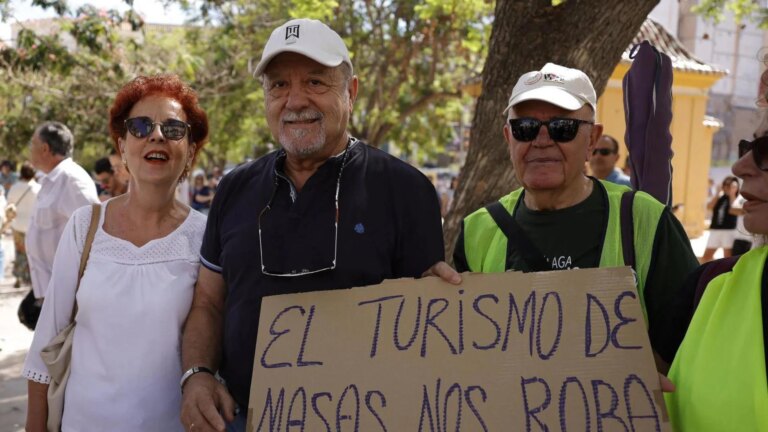Friday, July 5, 2024, 9:59 AM
Copy link
X (via Twitter)
telegram
thread
Malaga hoteliers, at a general meeting of the tourism industry association Majos on Wednesday, unanimously approved a collective declaration in support of the industry, in which they warned that “we have been witnessing for some time now with deep concern a hate-tourism movement whose motivations, diagnosis and envisaged solutions are entirely wrong”.
Faced with this situation, the association said it felt obliged to “sound the alarm and demand responsibility and firmness from public representatives”. In addition, hoteliers want to “avoid demagoguery that seeks to blame the tourism industry for problems that undoubtedly exist, such as the lack of housing or certain infrastructure”. The association noted that tourism is also affected by these factors “in the case of provinces that do not have accommodation for workers or that lack transport links connecting Málaga and Marbella”.

Full toss during the Mahos rally. Migue Fernández
The statement issued by the association is based on the importance of the sector, which is entering the tourism season with optimistic forecasts in terms of holidaymakers, accommodation, revenues and job creation. The association highlights that the sector is a key pillar of the economy, with a direct impact of 11 billion euros and generating more than 125,000 jobs, according to official data.
“These are figures that support the economies of Málaga and Andalusia, with tourism accounting for 15% of GDP. Tourism is an industry in the broadest sense: traditions, training, investment, infrastructure, innovation, wealth and job creation, sustainability efforts, promotion and planning,” the association asserted.
Tourist phobia demonstration
“The disqualification, or simply the lack of tourism advocacy, is tinged with political myopia and electoral short-termism. An international smear campaign sparked by the tourist phobia seen in the pro-housing demonstrations will be publicised and used by competitors,” the association added.
The Hospitality and Food Industry Association said it had “seen banners and heard declarations against tourism and against foreigners entering the country” and believed it was “unacceptable that our political representatives are not condemning or encouraging this attitude.”
“No society can pretend that it can solve its problems by abandoning or discrediting a key economic industry. That would be simply a fatal mistake,” the association said. It also argued that “it is incomprehensible that political leaders who have the power to deny basic infrastructure that contributes to the growth of the population of the province of Málaga, such as the coastal railway, should demonstrate against tourism.”
While the hoteliers said they had “the utmost respect for those who are demonstrating for the reality of the housing problem”, they denounced “the exploitation of this legitimate cause by political and social groups interested in attacking tourism without considering the harmful consequences of this position”. In this regard, they point out that, according to data from the Guestrisam Institute of Malaga City Council, 95 percent of tourist housing is in the hands of small owners and that legal reforms are underway to curb their increase.
What are the drawbacks of tourism?
“Measures have already been announced by Malaga City Hall, the Andalusian regional government and the Spanish government. Where is the responsibility of the tourism sector here? We demand a rigorous analysis, not a purely ideological one,” the statement said.
While acknowledging that “there are many variables that have not been taken into account,” they point out that the imbalance between supply and demand is clear: “Many people want to live in Málaga, because it has countless attractions, but there is a shortage of housing. The INE (National Statistics Institute) predicts that by 2031 the province will have more than two million inhabitants. A lot of planning is needed. It would be an insult to the population to expect simple solutions to a complex problem. Will attacking tourism make rents cheaper? It is clear that rents have risen by 20% across Spain since the housing law came into force,” they say in the manifesto.
While the industry believes a sober analysis is essential, the manifesto argues that sustainability is the future of the sector, adding: “Reckless behaviour that risks the livelihoods of hundreds of thousands of families in the state cannot be tolerated. The hotel and catering industry accounts for around 70% of tourism employment. If these messages achieve their objective, who will tackle the economic and employment disaster? How can you be so irresponsible?”

